Introduction - Paradigms lost, paradigms found: the New Milton Criticism
Published online by Cambridge University Press: 05 June 2012
Summary
“Conflict, ambivalence, and open-endedness” occupy a contested place in Milton studies. While discontinuities in Milton’s works have long been noted, Miltonists have traditionally regarded them as anomalies, and the critics who opted to explore, without resolving, them were often designated as marginal, or outliers in the field. The predilection for coherence and resolution in Milton studies has led Nigel Smith to observe that “the nature and complexity of [Milton’s] contradictory energy is not appreciated, even by Milton specialists.” The New Milton Criticism seeks to provide and encourage the appreciation Smith calls for. The chapters assembled here interrogate various paradigms of certainty that have characterized many contributions to the field. This book also intends to show through a variety of approaches how analyses of Milton’s irresolvable complexities can enrich our understanding of his writings. To be sure, as Paul Stevens recognizes, “there is a degree to which almost all Milton criticism tends to imagine itself, at some point, as the New Milton Criticism.” We hope, however, to earn this label by showcasing a Milton criticism resistant to reading Milton into coherence, a criticism that treats his work – Paradise Lost especially but not exclusively – as conflicted rather than serene, and that explicitly highlights the spirit of critical inquiry in Milton’s writing.
Interpretations of the Pilot metaphor in the first epic simile demonstrate how paradigms of certitude and a will to order have traditionally shaped criticism on Paradise Lost. In attempting to describe Satan’s size to the reader, the Muse declares that the fallen angel is as huge as:
that Sea-beast
Leviathan, which God of all his works
Created hugest that swim th’ Ocean stream:
Him haply slumbring on the Norway foam
The Pilot of some small night-founder’d Skiff,
Deeming some Island, oft, as Sea-men tell,
With fixed Anchor in his skaly rind
Moors by his side under the Lee, while Night
Invests the Sea, and wished Morn delayes:
So stretcht out huge in length the Arch-fiend lay.
(1.200–9)
Crucially, Milton defies expectation and his various sources by not supplying the anticipated or traditional conclusion. In fact, he leaves the episode unresolved, with the Pilot stranded on the whale “while Night / Invests the Sea, and wished Morn delayes” (1.207–8). Most readers assume that the whale dives and takes the Pilot with him, even though Milton’s verses provide no such evidence.
- Type
- Chapter
- Information
- The New Milton Criticism , pp. 1 - 22Publisher: Cambridge University PressPrint publication year: 2012
References
- 1
- Cited by



